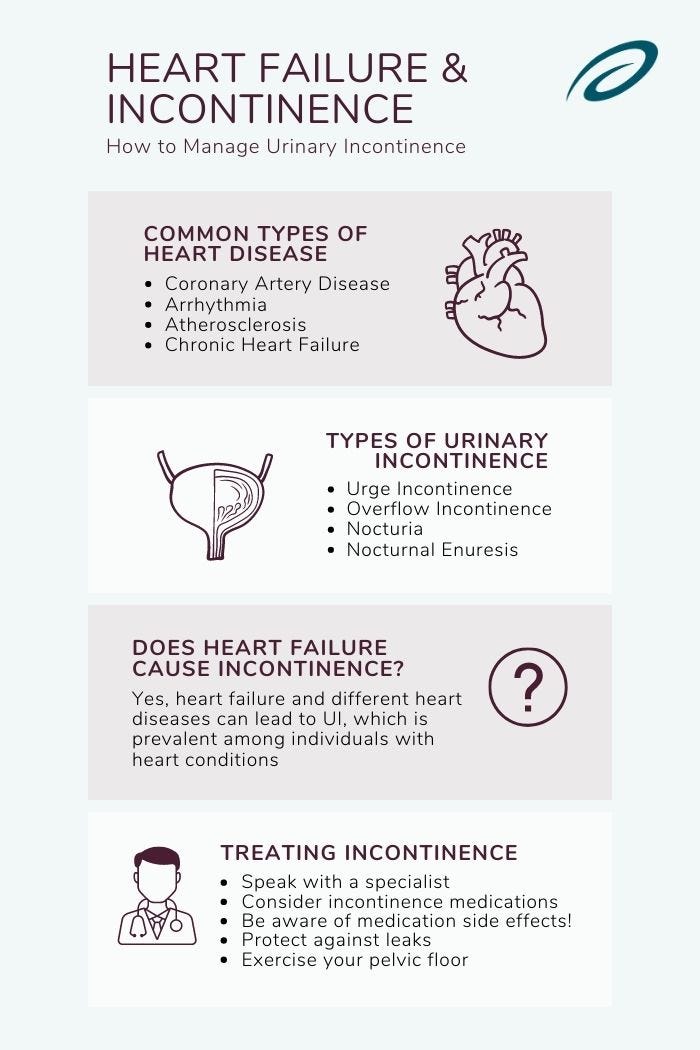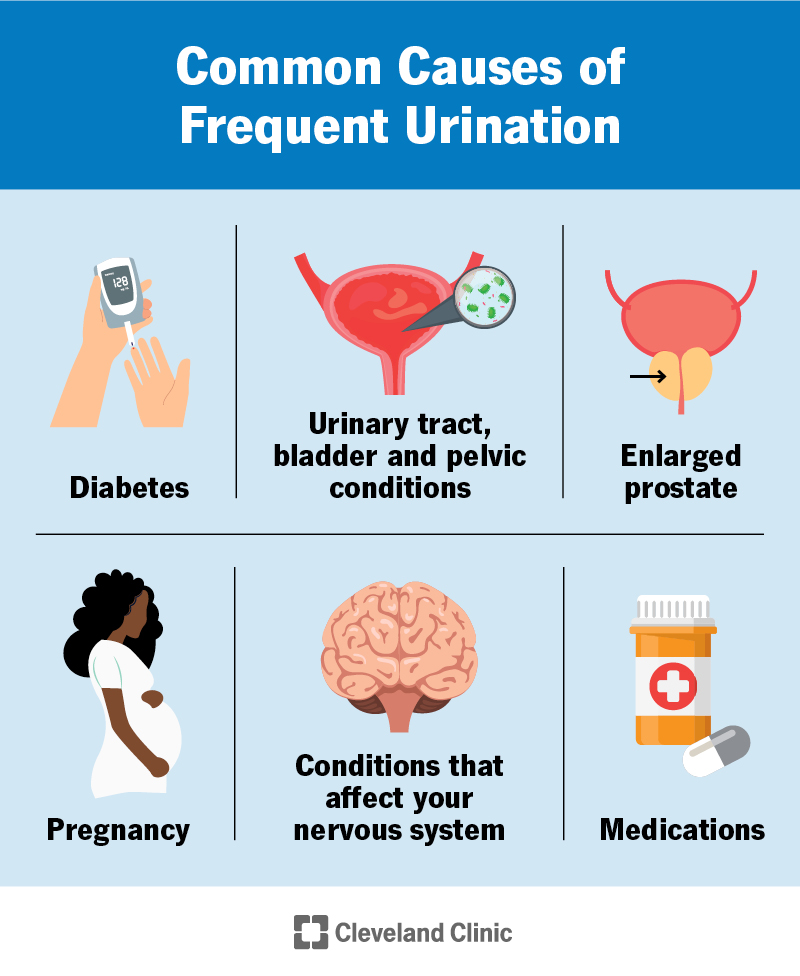Heart problems can cause frequent urination, especially in the case of heart failure. Heart failure can lead to a decreased blood flow to the kidneys, causing fluid retention and resulting in increased urination, particularly at night.
This can be one of the signs of heart failure progression. In addition to frequent urination, other symptoms of heart failure may include breathlessness, fatigue, swelling in the legs and ankles, and lightheadedness or fainting. It's important to be aware of these signs and seek medical attention if experiencing them.
Heart problems should not be taken lightly as they can significantly affect one's quality of life.

Credit: aeroflowurology.com
Connection Between Heart Problems And Frequent Urination
Frequent urination can be a symptom of various underlying health conditions, including heart problems. The connection between heart problems and frequent urination lies in the impact heart failure can have on the urinary system. Heart failure is a condition where the heart is unable to pump enough blood to meet the body's needs. This can lead to fluid retention and increased pressure in the blood vessels, causing the kidneys to produce more urine.
Signs Of Heart Failure
Recognizing the signs of heart failure is crucial in understanding its impact on urination. Some common signs of heart failure include:
- Breathlessness after activity or at rest
- Feeling tired most of the time and finding exercise exhausting
- Feeling lightheaded or fainting
- Swollen ankles and legs
These signs can be caused by fluid buildup in the body, which can affect the urinary system and result in frequent urination.
Impact Of Heart Failure On Urination
Heart failure can disrupt the normal functioning of the urinary system in several ways:
- Increased fluid retention: Heart failure can cause the body to retain excess fluid, leading to increased urine production.
- Decreased blood flow to the kidneys: When the heart is unable to pump enough blood, it can reduce blood flow to the kidneys. This can affect the kidneys' ability to filter waste and regulate urine production.
- Pressure on the bladder: The increased pressure in the blood vessels caused by heart failure can also put pressure on the bladder, leading to frequent urination.
It's important to note that frequent urination alone is not a definitive sign of heart problems. However, if you are experiencing frequent urination along with other symptoms of heart failure, it's essential to consult a healthcare professional for a proper diagnosis and appropriate treatment.

Credit: my.clevelandclinic.org
Understanding The Symptoms
Heart problems can lead to frequent urination due to decreased blood flow to the kidneys, resulting in fluid retention. This can be a sign of heart failure progression and should be monitored closely. Other symptoms include breathlessness, fatigue, and swollen ankles, which can indicate underlying heart issues.
Recognizing Heart-related Symptoms
When it comes to heart problems, it's crucial to recognize the symptoms early on. Heart-related symptoms often manifest as breathlessness after activity or at rest, feeling tired most of the time, and finding exercise exhausting. You may also experience feelings of lightheadedness or fainting, as well as swollen ankles and legs. These warning signs indicate potential heart failure, a serious condition that requires immediate medical attention.
Identifying Urinary Symptoms
If you've been experiencing frequent urination along with the aforementioned heart-related symptoms, it's important to recognize this as a potential sign of heart problems. Excess fluid buildup from your kidneys can result in increased urination, especially at night. This increased frequency of urination can be disruptive and uncomfortable. The connection between heart problems and frequent urination lies in decreased blood flow to the kidneys caused by heart failure.
In addition to frequent urination, other urinary symptoms that may accompany heart-related issues include a sense of urgency and nocturia, which is the need to urinate multiple times during the night. These symptoms can be distressing and may significantly impact your quality of life.
Exploring The Link
Frequent urination can be a sign of heart problems, especially in cases where there's a decreased blood flow to the kidneys, leading to fluid retention. These symptoms indicate a possible link between heart health and frequent urination, signifying the importance of monitoring cardiovascular health closely.
the symptoms that can occur as a result of heart problems is frequent urination. This may seem like an unrelated issue, but there is actually a strong link between heart disease and bladder function. In this section, we will explore the connection between heart problems and frequent urination, focusing on the subheadings: Nocturia and Heart Disease, and Bladder and Bowel Issues in Heart Failure.
Nocturia And Heart Disease
Nocturia, or the need to wake up during the night to urinate, is a common symptom experienced by individuals with heart disease. It can be a result of different factors related to the heart's functioning. For instance, inadequate blood flow to the kidneys can lead to increased urine production, causing the need to urinate more frequently. Additionally, excess fluid buildup in the body due to heart failure can put pressure on the bladder, leading to nocturia. This symptom should not be ignored, as it may be an indication of underlying heart problems.
Bladder And Bowel Issues In Heart Failure
Heart failure can have a significant impact on bladder and bowel function. When the heart fails to pump blood effectively, it can result in fluid retention, leading to swelling in different parts of the body, including the legs and abdomen.
This excess fluid can also affect the bladder and bowel, causing issues such as frequent urination and constipation. The compromised blood flow to the kidneys can disrupt the normal urine production and elimination process, leading to urine retention or increased frequency. Similarly, constipation can occur due to reduced blood supply to the intestines.
Therefore, it is crucial to recognize these bladder and bowel issues as potential signs of heart failure and seek medical attention promptly. In conclusion, there is a clear connection between heart problems and frequent urination. Conditions such as nocturia and bladder and bowel issues can be caused by heart disease, and should not be overlooked.
If you are experiencing frequent urination along with other symptoms of heart problems, it is important to consult with a healthcare professional for proper diagnosis and treatment.
Seeking Treatment
Heart problems can cause frequent urination, especially at night, due to the excess fluid retained in the body. This is a sign of heart failure progression and should be addressed by seeking medical treatment.
Managing Heart Failure Symptoms
For individuals with heart problems who experience frequent urination, managing heart failure symptoms becomes a critical aspect of seeking treatment. Heart failure can lead to a range of issues, including fatigue, breathlessness, and fluid retention in the ankles and legs. These symptoms can put additional strain on the heart and exacerbate urinary concerns.
Managing heart failure symptoms typically involves a combination of lifestyle changes, medication, and medical interventions. Here are some strategies to consider:
- Dietary Modifications: Adopting a heart-healthy diet rich in fruits, vegetables, whole grains, lean proteins, and healthy fats can help control blood pressure and cholesterol levels, reducing the risk of heart problems and associated urinary issues.
- Exercise: Engaging in regular physical activities, as advised by a healthcare professional, can improve heart function, strengthen cardiovascular health, and relieve symptoms of heart failure, including frequent urination.
- Medication: Taking prescribed medications, such as diuretics, beta-blockers, or ACE inhibitors, can help manage heart failure symptoms and reduce water retention, leading to a decrease in urinary frequency.
While these lifestyle modifications and medications can provide significant relief, it's crucial to consult with a healthcare professional before implementing any changes. They can create a personalized treatment plan based on the individual's specific condition and circumstances.
Addressing Urinary Concerns
When seeking treatment for heart problems and frequent urination, it's essential to address the specific urinary concerns accompanying heart failure. Here are some strategies to consider:
- Fluid Intake Management: Monitoring fluid intake and limiting excessive consumption can help prevent fluid overload and reduce urinary frequency.
- Timed Voiding: Establishing a voiding schedule to empty the bladder at regular intervals can help manage frequent urination and maintain bladder control.
- Bladder Training: Working with a healthcare professional to develop a bladder training program can help gradually increase the interval between urinations and improve bladder function.
- Kegel Exercises: Strengthening the pelvic floor muscles through Kegel exercises can improve bladder control and reduce the urgency and frequency of urination.
By incorporating these strategies into a comprehensive treatment plan, individuals with heart problems and frequent urination can take control of their symptoms and improve their overall well-being. It's crucial to work closely with a healthcare professional to ensure the most effective and safe management of both heart failure and urinary concerns.

Credit: www.anxietycentre.com
Frequently Asked Questions Of Can Heart Problems Cause Frequent Urination
What Are The 4 Signs Your Heart Is Quietly Failing?
Signs of heart failure include breathlessness, fatigue, lightheadedness, and swollen ankles/legs.
What Are At Least 3 Early Warning Signs Of Heart Disease?
Early warning signs of heart disease include chest pain, shortness of breath, and swelling in the legs.
What Are The 4 Signs Of An Impending Heart Attack?
The four signs of an impending heart attack are chest pain, shortness of breath, pain or discomfort in the jaw, neck, back, arm, or shoulder, and feeling nauseous, light-headed, or unusually tired.
What Are The Early Signs Of Heart Blockage?
The early signs of heart blockage include chest pain, shortness of breath, neck or jaw pain, and numbness in the arms or legs. Additionally, frequent urination, especially at night, and swelling in the feet may also indicate heart failure. A weak heart can cause fluid retention, leading to increased urination.
Conclusion
Frequent urination can be a surprising symptom of heart problems, especially heart failure. When the heart is weak and unable to pump blood efficiently, fluid can build up in the body, causing increased urination, especially at night. This excess fluid puts pressure on the kidneys, leading to more frequent trips to the bathroom.
Therefore, if you are experiencing frequent urination along with other symptoms such as fatigue, shortness of breath, and swelling in the legs, it's important to consult a healthcare professional to rule out any underlying heart issues. Taking care of your heart health is crucial for overall well-being.






0 Comments